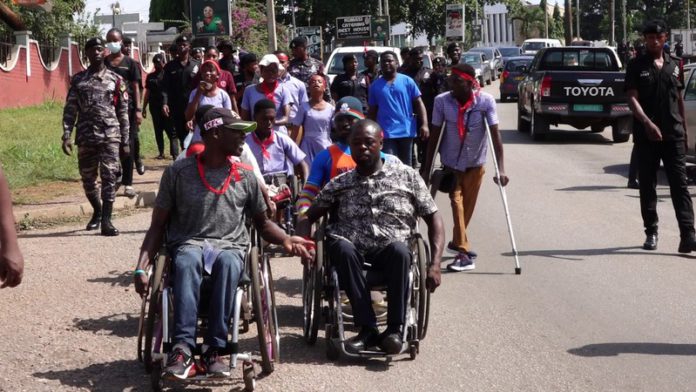Imagine arriving at work every day, only to be forced to wait for helpful passersby to carry you upstairs because the building lacks a functional elevator or ramp.
Or picture yourself navigating through glass doors, constantly fearing collisions due to a lack of markings or warnings.
For millions of people with disabilities (PWDs), this is their daily reality.
The daily struggles of PWDs are often invisible to the able-bodied community, but they are real and frustrating.
In Ghana, most buildings are largely inaccessible to (PWD’s). Public and private buildings, schools, hospitals, and transportation systems neglect basic accessibility features.
Despite the passage of the Disability Act 715 in 2006, people with disabilities continue to face significant barriers when accessing various public buildings.
Eighteen years after the passage of the Persons with Disabilities (PWD) Act, the law remains stagnant and ineffective, failing to yield tangible progress in promoting inclusivity and equality for individuals with disabilities.
As a result, PWDs continue to face various obstacles in their daily lives, and the promise of equal opportunities and dignity remains unfulfilled.
Notably, even government buildings, which should set the standard for accessibility, are largely disability unfriendly.
The majority of government buildings lack accessibility features, creating significant barriers for individuals with disabilities, which raises concerns about the government’s ability to enforce accessibility standards elsewhere.
With inadequate ramps these buildings fail to meet basic disability requirements, undermining the government’s credibility in regulating private sector accessibility.
To effectively promote inclusivity, the government must first address its own infrastructure gaps.
By leading by example and ensuring its buildings are disability-friendly, the government can then credibly hold businesses accountable for compliance with disability laws, fostering a truly inclusive environment for all citizens.
Ironically, the very institutions meant to uphold justice – courts and police stations –are inaccessible to people with disabilities, denying them access to fairness and protection. Where can they find help when the system fails them?
The law mandates accessibility, but enforcement remains ineffective, perpetuating inequality and exclusion.
This enforcement gap allows inaccessibility to persist, severely limiting PWD’S access to opportunities.
Inadequate sanctions, insufficient funding, and lack of awareness hinder stringent implementation, leaving vulnerable populations marginalized and excluded from fully participating in society.
To fix this, stronger rules, more funding, and awareness are needed to hold people accountable and ensure equal opportunities.
People with disabilities demand inclusiveness not pity. They seek equal access to education, employment and public buildings.
It has become very necessary to create a more equitable and inclusive society for people with disabilities.
We must enforce disability laws, incorporate accessibility features in new building designs, retrofit existing structures and provide training on disability awareness and inclusivity.


